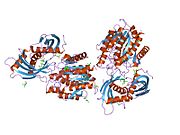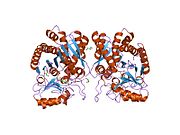
Kallikrein-10 is a protein that in humans is encoded by the KLK10 gene.

Progressive ankylosis protein homolog is a protein that in humans is encoded by the ANKH gene.

Mesoderm-specific transcript homolog protein is a protein that in humans is encoded by the MEST gene.
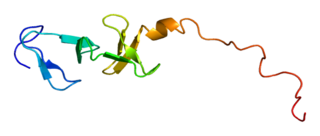
Cysteine and glycine-rich protein 1 is a protein that in humans is encoded by the CSRP1 gene.

Carboxypeptidase N catalytic chain is an enzyme that in humans is encoded by the CPN1 gene.

Carboxypeptidase A2 is an enzyme that in humans is encoded by the CPA2 gene.

Testis-specific chromodomain protein Y 1 is a protein that in humans is encoded by the CDY1 gene.

Ubiquitin-conjugating enzyme E2 H is a protein that in humans is encoded by the UBE2H gene.

Cysteine-rich with EGF-like domain protein 1 is a protein that in humans is encoded by the CRELD1 gene.

Carboxypeptidase A1 is an enzyme that in humans is encoded by the CPA1 gene.

Carboxypeptidase A3 (mast cell carboxypeptidase A), also known as CPA3, is an enzyme which in humans is encoded by the CPA3 gene. The "CPA3" gene expression has only been detected in mast cells and mast-cell-like lines, and CPA3 is located in secretory granules. CPA3 is one of 8-9 members of the A/B subfamily that includes the well-studied pancreatic enzymes carboxypeptidase A1 (CPA1), carboxypeptidase A2 (CPA2), and carboxypeptidase B. This subfamily includes 6 carboxypeptidase A-like enzymes, numbered 1-6. The enzyme now called CPA3 was originally named mast cell carboxypeptidase A, and another protein was initially called CPA3. A gene nomenclature committee renamed mast cell carboxypeptidase A as CPA3, and the original CPA3 reported by Huang et al. became CPA4 to reflect the order of their discovery.

Chymotrypsin-like elastase family member 2A is an enzyme that in humans is encoded by the CELA2A gene.

Apolipoprotein L6 is a protein that in humans is encoded by the APOL6 gene.

Breast carcinoma amplified sequence 3, also known as BCAS3, is a protein which in humans is encoded by the BCAS3 gene. BCAS3 is a gene that is amplified and overexpressed in breast cancer cells.

Seizure 6-like protein is a protein that in humans is encoded by the SEZ6L gene.

Probable carboxypeptidase X1 is an enzyme that in humans is encoded by the CPXM1 gene.
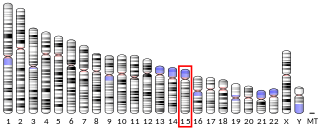
Non-imprinted in Prader-Willi/Angelman syndrome region protein 2 is a protein that in humans is encoded by the NIPA2 gene.
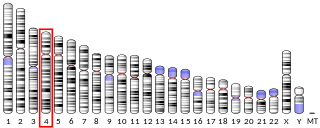
Carboxypeptidase Z is an enzyme that in humans is encoded by the CPZ gene.

Carboxypeptidase A5 is an enzyme that in humans is encoded by the CPA5 gene.
In molecular biology, MEST intronic transcript 1, antisense RNA, also known as MESTIT1 or PEG1-AS is a long non-coding RNA. It is an imprinted gene, which is paternally expressed. In humans, it is found on chromosome 7q32, imprinted genes on chromosome 7 are believed to be involved in Russell-Silver syndrome (RSS). However, it is believed that MESTIT1 is unlikely to cause Russell-Silver syndrome as there is a lack of mutations in this gene in Russell-Silver syndrome patients. MESTIT1 may regulate the expression of the MEST gene.





















